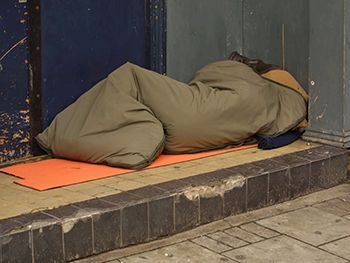University News Last updated 13 April 2022

New research from Birmingham City University has documented the feelings of vulnerability and incidents of exploitation that those living on the streets experience, by gathering first-hand accounts from some of the city’s rough sleepers.
Direct testimonies form the basis of a newly published peer-reviewed journal article titled Living Rough, An exploratory study on the vulnerabilities of rough sleepers in Birmingham, United Kingdom.
Findings in the report suggest that rough sleepers’ feelings of exclusion from society and their lack of trust in major institutions can perpetuate their situation.
The academics behind the study hope that the revelations and recommendations will kickstart changes in policy and practice to better help those living on the street escape this pattern of mistreatment and manipulation.
Proposals to address the issues raised in the report include:
- an increase in multi-agency work between charities and other third sector groups
- more comprehensive analysis of homelessness data from government
- larger-scale academic investigation of the vulnerabilities of rough sleeping
- closer working with those who have experienced rough sleeping in further studies.
Dr Mohammed Rahman, a Senior Lecturer in Criminology at Birmingham City University, led the research. He explained:
Mohammed and his research colleague Maram Abdulkader were interested in speaking to people who had experience of rough sleeping in the city, who either felt vulnerable or criminally exploited or who had witnessed others in a similar situation.
In total, five rough sleepers – three males and two females – agreed to be interviewed for the study, via one of the country’s biggest youth homelessness charities.
All were aged 18 to 30, had been on the streets for a period ranging from one and a half to six years and all were White, which at 84 per cent according to national data, is the most common ethnicity of rough sleepers in the UK. A focus group discussion and follow-up one-to-one interviews took place between March and July 2020. Interviews were conducted with caseworkers present as safeguards and all respondents’ answers were anonymised.
The research team analysed data over several months and identified three key themes that spoke to specific aspects of vulnerability in rough sleepers: an erosion of trust in mainstream society and its functions; feelings of exclusion from society alongside a sense of community among their peers; and experience of varying degrees of exploitative behaviour.
The authors found that negative attitudes towards rough sleepers, triggered by their appearance, behaviour, reputation or simply their street presence, left them feeling unaccepted and rejected. This in turn eroded their trust in the general public and the state, including care services and law enforcement. As one of the respondents, ‘Mull’, put it: “The police will treat you more like an offender than a victim because of your past…they’ll look at you and be like ‘well you’re the cause of the problem, jog on.’”
Feelings of marginalisation and mistrust also led rough sleepers to turn to each other for comfort and security, forming relationships to cope with life on the streets. “The homeless have a very strong communal bond with each other. It’s because the homeless can only support other homeless people”, explained another interviewee, ‘Kurt’.
These friendships made it easier and more desirable for them to continue sleeping rough instead of seeking housing, despite the associated discomfort, risks of violence and other forms of exploitation, which all participants were aware of and had experienced to varying degrees. “We witness [harm], every type, every day,” as Kurt starkly put it.
The authors also found that bonds formed among rough sleepers are particularly strong, being based on shared history and experience, which sometimes includes unhealthy behaviours such as drug and alcohol abuse. This can create a mutual dependency but can also lead to exploitation from criminal gangs preying on the vulnerable and even among the homeless themselves.
Contributor Kurt spoke of his experiences of stealing and acting as a drug runner to sustain his addiction. “The first [homeless] guy that I met in Birmingham used to make me shoplift”, he said. Homeless women are even more likely to experience violence and victimisation, as was the situation for “Jesse”, whose drug habit resulted in her turning to prostitution under the coercive control of a street sex trafficker.
Jesse is in a relationship with Kurt, and he helped her overcome her addiction. She is now off the streets but at one point while she was rough sleeping and engaged in sex work, the only person she could rely on to sustain her was her abuser and so she was mired in a reproductive circle of suffering.
Researcher Maram Abdulkader added: